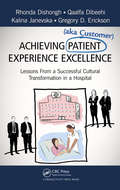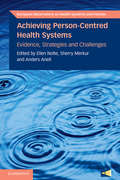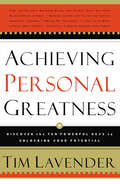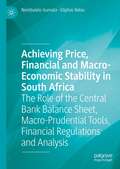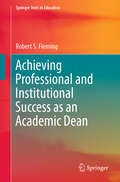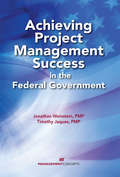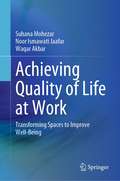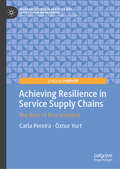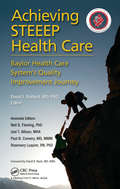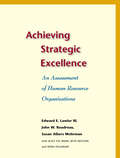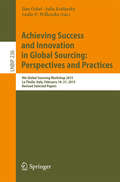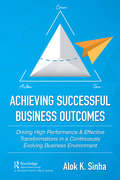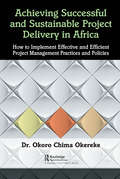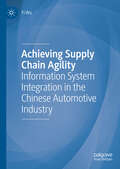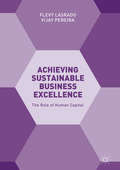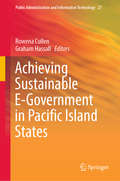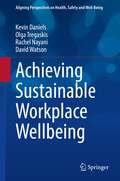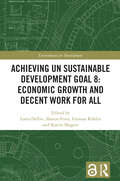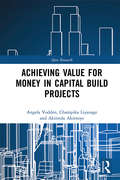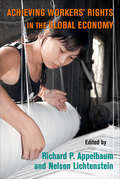- Table View
- List View
Achieving Organizational Excellence: A Quality Management Program For Culturally Diverse Organizations (Management For Professionals)
by Flevy LasradoThis book bridges two essential aspects of assessing and achieving business excellence in 21st-century organizations. The author argues that transnational companies face a twofold challenge: managing global knowledge networks and multicultural project teams on the one hand; and interacting and collaborating across boundaries using global communication technologies, on the other.<P><P> The author also argues that this dual challenge calls for the creation of a business excellence program that fits and thrives within these multicultural environments. In response, he reviews corporate practices in quality management and business excellence frameworks that have been extensively used on a transnational scale to drive organizational performance. The book approaches quality management as an element that is no longer a choice, but has now become a necessity if companies want to compete in highly globalized environments.<P>
Achieving Patient (aka Customer) Experience Excellence: Lessons From a Successful Cultural Transformation in a Hospital
by Rhonda Dishongh Qaalfa Dibeehi Kalina Janevska Gregory D. EricksonWritten by internationally acknowledged experts in the customer and patient experience movement, this book clearly outlines the principles and development phases of a great customer experience transformation. Using an engaging story, it allows readers to follow the journey of Community General, a healthcare organization that went from struggling to being nationally recognized for its performance and customer satisfaction. Demonstrating how Community General was able to achieve its cultural transformation, the book presents valuable lessons learned that can be applied across a wide range of industries.
Achieving Person-Centred Health Systems: Evidence, Strategies and Challenges (European Observatory on Health Systems and Policies)
by Ellen Nolte Sherry Merkur Anders AnellThe idea of person-centred health systems is widely advocated in political and policy declarations to better address health system challenges. A person-centred approach is advocated on political, ethical and instrumental grounds and believed to benefit service users, health professionals and the health system more broadly. However, there is continuing debate about the strategies that are available and effective to promote and implement 'person-centred' approaches. This book brings together the world's leading experts in the field to present the evidence base and analyse current challenges and issues. It examines 'person-centredness' from the different roles people take in health systems, as individual service users, care managers, taxpayers or active citizens. The evidence presented will not only provide invaluable policy advice to practitioners and policymakers working on the design and implementation of person-centred health systems but will also be an excellent resource for academics and graduate students researching health systems in Europe.
Achieving Personal Greatness: Discover the 10 Powerful Keys to Unlocking Your Potential
by Tim LavenderFor years, a maxim of the United States Army was "Be all that you can be." While that familiar slogan may sound simple, there is great depth to the meaning behind it. in Achieving Personal Greatness, Tim Lavender offers his definition of "personal greatness" through three basic laws, and then shares the seven guiding principles for achieveing it. His practical guide explores ten powerful keys for releasing you potential, including: Get Your Cart Before the Horse, Reach Inside the Invisible World, Embrace a Lifetime of Learning,, and Seek to Influence Rather than Control. Finally, Lavender shares te five commitments that are necessary for producing results.For those desiring to explore their untapped potiential in all areas of life, Achieveing Personal Greatness is an ideal resource.
Achieving Price, Financial and Macro-Economic Stability in South Africa: The Role of the Central Bank Balance Sheet, Macro-Prudential Tools, Financial Regulations and Analysis
by Eliphas Ndou Nombulelo GumataThis book explores the macro-financial effects of central bank balance sheets, macro-prudential tools, and financial regulation in South Africa. How employment can be maximised while keeping inflation low and stable is examined in relation to the structural changes required to alter the composition of South African bank balance sheets. Quantitative methods and approaches are utilised to highlight the impact of suggested policies. This book aims to outline strategies and policy interventions that can help achieve the National Development Plan in South Africa. It will be of interest to researchers and policymakers working within development economics, African economics, development finance, and financial policy.
Achieving Professional and Institutional Success as an Academic Dean (Springer Texts in Education)
by Robert S. FlemingThis book addresses the numerous challenges that academic deans need to understand and address throughout a successful career in academic administration. It provides essential guidance regarding the various aspects of professional and institutional success, including what academic deans need to know and the role that each topic plays in contributing to professional and institutional success. Each of the nine chapters considers essential aspects of becoming and remaining a successful, transformational, and resilient academic dean including: (1) contemporary higher education; (2) the academic deanship; (3) roles and responsibilities of an academic dean; (4) working with stakeholders; (5) career advancement and success; (6) preparing yourself; (7) preparing your people; (8) preparing your organization; and (9) ensuring continued professional and institutional success. The mission of the book is to contribute to the success of readers throughout their careers as academic deans and enhance not only their professional success and resilience, but also that of the institutions that they manage and lead as transformational and visionary leaders. It prepares individuals for career success as an academic dean through equipping them with the knowledge, skills, and confidence that enables them to ensure the present and future success, resilience, and survival of institutions that they have the privilege to manage and lead as academic deans. The book is intended for both those who aspire to these positions as well as those currently serving as academic deans, associate deans, assistant deans, or in related leadership positions.
Achieving Project Management Success in the Federal Government
by Jonathan Weinstein PMP Timothy Jacques PMPGain Valuable Insight into the Government's Project Management Best Practices!Although project management is not new to the federal government, the discipline has taken on renewed importance in the face of the ever-increasing size, complexity, and number of mission-critical projects being undertaken by every branch and agency. This book addresses the key facets of project management, from organization and structure to people and process. A variety of government entities share their best practices in areas including leadership, technology, teams, communication, methodology, and performance management.Based on research and interviews with a wide range of project managers, Achieving Project Management Success in the Federal Government presents a realistic cross section of the project management discipline in the largest single enterprise in the world—the U.S. federal government.
Achieving Quality of Life at Work: Transforming Spaces to Improve Well-Being
by Suhana Mohezar Noor Ismawati Jaafar Waqar AkbarThis book provides an understanding and imaging of how a stress-free workplace might be designed and implemented in the context of the ‘new normal.’ Statistics show that more and more people are experiencing an increase in work-related stress, and its impact on individual psychology and well-being as well as organizational performance can be devastating. Globally, the most recent data on work-related illnesses account for 2.4 million deaths. Against this backdrop, and taking stock of how the pandemic is affecting the workplace and employee well-being, this book proposes transformations in work spaces, from implementing effective “greening” features, to more efficient technology-supported spaces. It establishes links between workplace design and creativity, happiness and productivity, confronting related issues such as generation gaps, digital interruptions, collaborative work environments and sustainability, and their respective connections with workspace environment and well-being. The book situates this discussion within a broader discussion on work and quality of life. Furthermore, the book demonstrates how several sustainable development goals might be achieved through transformed work spaces. Through an intersection between organizational psychology, well-being and quality of life studies, sociology, human resources, and ergonomics, this book is a timely examination of work-related stress in relation to work spaces that require rethinking and transformation in the throes, and wake, of the pandemic.
Achieving Resilience in Service Supply Chains: The Role of Procurement (Palgrave Studies in Logistics and Supply Chain Management)
by Carla Pereira Öznur YurtIn today’s increasingly service-oriented global economy, the activities and transactions within and between supply chain members in the service sector have experienced substantial growth. This book addresses the unique challenges faced by service businesses and emphasizing the importance of service supply chain management decisions on competitiveness and performance.By adopting a service supply chain perspective, this book offers valuable insights for defining, designing, and effectively managing service procurement processes for all stakeholders involved, such as service suppliers, service providers, and customers. This inclusive viewpoint ensures a holistic understanding of the entire service supply chain, considering the interconnected relationships and dependencies among its members. By combining scholarly insights, practical examples and guidelines, it will be of great interest to students and academics of supply chain management and procurement, as well as service supply chain managers looking for advanced strategies.
Achieving STEEEP Health Care: Baylor Health Care System's Quality Improvement Journey
by David J. BallardWinner of a 2014 Shingo Research and Professional Publication Award!Reaching America‘s true potential to deliver and receive exceptional health care will require not only an immense and concerted effort, but a fundamental change of perspective from medical providers, government officials, industry leaders, and patients alike. The Institute of
Achieving Safe Health Care: Delivery of Safe Patient Care at Baylor Scott & White Health
by Jan ComptonWinner of a 2016 Shingo Research and Professional Publication Award!A recent article published in the Journal of Patient Safety estimated that more than 400,000 lives are lost each year due to preventable patient events in American hospitals. Preventable patient safety events are the third leading cause of death in the United States. While most hea
Achieving Stabilization in Armenia
by Balázs Horváth Nita Thacker Jiming HaAchieving Stabilization in Armenia
Achieving Strategic Alignment: From Top to Bottom
by Robert S. Kaplan David P. NortonImplementing strategy begins by educating and involving the people who must execute it. By communicating the strategy and by linking it to personal goals, the Balanced Scorecard creates a shared understanding and commitment among all organizational participants. This chapter describes how organizations have used the Balanced Scorecard to communicate their new strategies to all employees, aligning departmental, team, and individual goals to successful implementation of the strategy. This chapter was originally published as chapter 9 of "The Balanced Scorecard: Translating Strategy into Action."
Achieving Strategic Excellence: An Assessment of Human Resource Organizations
by Edward Lawler John Boudreau Alice Mark Beth Neilson Center for University of Southern California Nora Osganian Susan MohrmanThis is the Center for Effective Organizations's (CEO) fourth national study of the human resources (HR) function in large corporations. It is the only long-term national study of this important function. Like the previous studies, it focuses on measuring whether the HR function is changing and on gauging its effectiveness. The study focuses particularly on whether the HR function is changing to become an effective strategic partner. It also analyzes how organizations can more effectively manage their human capital. The present study compares data from earlier studies to data collected in 2004. The results show some important changes and indicate what HR needs to do to be effective. Practices are identified that enable HR functions to be high value-added strategic partners.
Achieving Success and Innovation in Global Sourcing: 9th Global Sourcing Workshop 2015, La Thuile, Italy, February 18-21, 2015, Revised Selected Papers (Lecture Notes in Business Information Processing #236)
by Julia Kotlarsky Ilan Oshri Leslie P. WillcocksThis book constitutes revised selected papers from the 9th international Global Sourcing Workshop 2015, held in La Thuile, Italy, in February 2015. The 14 contributions included were carefully reviewed and selected from 40 submissions. The book offers a review of the key topics in outsourcing and offshoring, populated with practical frameworks that serve as a tool kit to students and managers. The range of topics covered is wide and diverse, but predominately focused on how to achieve success and innovation in global sourcing. The topics discussed combine theoretical and practical insights regarding challenges that industry leaders, policy makers, and professionals face. Case studies from various organizations, industries and countries are used extensively throughout the book to illustrate results and findings.
Achieving Successful Business Outcomes: Driving High Performance & Effective Transformations in a Continuously Evolving Business Environment
by Alok K. SinhaAchieving Successful Business Outcomes: Driving High Performance & Effective Transformations in a Continuously Evolving Business Environment (978-1-003-00939-9, 346640) "The missing manual for CXOs who want to understand the reasons their growth strategies are faltering and how to reinvigorate them."Steven Sonsino, London Business School, author of Leadership Unplugged and The Seven Failings of Really Useless Leaders "A valuable and important contribution to our future relevance toolkit!" Anton Musgrave, Futurist and Senior Partner, Future World International "A timely and compelling book that demystifies what it takes to drive change in a volatile and turbulent business environment."Sudhanshu Palsule, author of Rehumanizing Leadership, The Social Leader and Managing in Four Worlds "Not just a compendium of practical business lessons but also a new and powerful extendable model that can be used to evolve, evaluate and execute risk-calibrated business strategies.Piyush Sharma, School of Marketing, Faculty of Business and Law, Curtin University, Australia; Associate Editor, Marketing – Journal of Business Research; Regional Editor – Journal of Knowledge Management "The framework is very innovative and relevant in today’s highly competitive business environments. An important and valuable contribution to improving managerial and organizational effectiveness." Vinod Singhal, Charles W. Brady Chair, Scheller College of Business, Georgia Institute of Technology Navigating in space is exponentially more difficult than navigating on the road – because there are too many directions to investigate, too many unknowns to be prepared for and infinite pathways to chart in the galactic system. So it is with business. Business environments are extremely demanding and change continuously, precipitated by innumerable actors and conditions. Business success cannot be predicated on the pedigree of a leader or a prescribed theory alone, as start-ups have amply proven. Large companies have tried to copy nimble-footed start-ups while start-ups, after achieving a certain size, have been forced to adapt to unchartered territory. Disruptions seems to be the order of the day. This book is about achieving successful business outcomes. An aircraft has a complex dashboard of dials, where only a critical few need to be monitored continuously, and other subsets warrant attention only during specific phases of the flight. A well-modeled business can be managed successfully using a similar strategy. But the larger question is how to model a business, with closely correlated variables, to represent the reality of the environment and to allow for devising, formulating and adjusting business strategy and actions in real-time. The author uses a simple but well-researched STA-Triangle (space, time and action) model to achieve this purpose. The core of the STA model is to help navigate effectively in a rapidly changing business environment. Unlike traditional business studies that use a single lens to define business rules or organizational practices, it uses the combination of space, time and action as the driver of outcomes – something fundamental and core to human thinking across the ages. This book contains both theoretical and practical applications – the former helps propel further research and analysis and the latter helps practicing leaders confidently drive their firms forward in any environmental conditions. It will also help causal readers understand how the future is evolving and how different organizations are responding to this change. The author includes more than a hundred supporting examples and tools that help create highly incisive and unique views for calibrating strategy and execution.
Achieving Successful and Sustainable Project Delivery in Africa: How to Implement Effective and Efficient Project Management Practices and Policies
by Dr. Okoro OkerekeAfrican nations have an underdeveloped industrial and economic base such as their water supply, electrical systems, roads, railways, etc. Massive funding is required to build each of these basic services to the levels of developed nations – funding they don’t have. Many African countries rely on assistance from the government and global companies looking to invest or facilitate projects in the region. And for a variety of reasons, many of these projects fail or are inadequate to fulfil the needs of the nation. In order to facilitate their own economic development, African nations need to cultivate efficient project management practices and policies that will help them achieve their goal of sustainability. This book by a multidisciplinary project management consultant, contributes to the body of knowledge that each African country can attain and sustain economic development by suggesting how to eliminate and correct most causes of failures of projects in construction, water treatment, electricity and renewable energy. It suggests that they should also be able to obtain the sustainable harvesting of the benefits of project deliverables which have been planned for in order to implement the various aspects of their economic development. The suggestions in this book will make a difference in project delivery and are comprehensive enough to create a root-and-branch change which will affect the people involved in making decision on projects and their delivery. Thus, project management teams and their managers, organization decision makers, companies looking to invest in the region, and politicians who plan the economy have to understand the causes of unhelpful practices and what needs to be done in order to produce productive and effective delivery of long-term sustainable project. The principal goal of this book is to advise public and private companies, and international organizations conducting projects in Africa on how to prepare themselves, their businesses and enterprises to solve the problems that cause failure of projects and abandonment of project deliverables. The book also recommends the necessity for a commercial enterprise or government entity to prepare and develop its vision, mission, and strategic objects to constitute the basis of a business plan which should be implemented for successful operations. After first identifying various failed and abandoned projects in Nigeria, Ghana and South Africa, the author provides an analysis of why these projects failed or were abandoned. By using methodologies of Organizational Project Management (OPM), Project Portfolio Management (PPM) and project management techniques, he suggests a framework for project delivery which could be used as a foundational structure and platform that will address the problem and provide solutions for the achievement of successful and sustainable project delivery in Africa.
Achieving Supply Chain Agility: Information System Integration in the Chinese Automotive Industry
by Yi WuThis book identifies factors of information system (IS) integration that influence supply chain agility and illustrates how IS integration can achieve greater supply chain agility. Also considering the consequent operational impacts that arise from IS-enabled supply chain agility, the author presents real-life examples through interviews and surveys to explore how IS integrations affect supply chain agility in the context of the Chinese automotive industry. The ability to swiftly respond to competitive challenges is a key element in industry 4.0 and organisations with agile supply chains are better prepared to respond to uncertainties and changes. This book develops and presents guidelines on the deployment of information system integration in order to achieve efficient agile supply chains.
Achieving Sustainable Business Excellence: The Role Of Human Capital
by Vijay Pereira Flevy LasradoCompiling the best practices of business excellence frameworks around the world, this new book addresses the need for innovative research on sustainable business performance. Using detailed empirical studies, the authors outline the motives and benefits of the implementation of such frameworks in different geographical regions. Comprehensive case studies showcase how the variety of excellence frameworks are manifested in their work cultures, values and beliefs. Academics studying quality management, HRM, and international business will find this book an essential read as it establishes the relevance of human capital in achieving and sustaining global business excellence.
Achieving Sustainable E-Government in Pacific Island States (Public Administration and Information Technology #27)
by Rowena Cullen Graham HassallThis book analyzes the common set of obstacles to the development and integration of government Information and Communication Technology (ICT) projects and effective e-government initiatives in developing countries. It draws on the expertise and experience of more developed states in the Pacific, notably Australia and New Zealand, both highly rated in global rankings for e-government and active in a variety of e-government development projects across the region. There has been a general failure to identify priorities and align projects with local needs in ICT/e-government projects. Small Island Developing States (or SIDS) present a unique problem in terms of e-government. Not only do they suffer from a common set of barriers to ICT development such as their remoteness, geographical dispersion, moist tropical climates, largely rural populations, and lack of ICT capacity and infrastructure, but are also dependent on external agencies for investment, and must negotiate with powerful donors who have conflicting agendas. E-government is widely regarded as 'transformational', increasing efficiency, productivity, accountability, economic growth, and citizen involvement. But while the governments of SIDS are committed to harnessing ICTs for effective government and economic development, they face major challenges in establishing successful e-government initiatives, due to the problems outlined above, coupled with a lack of HR capacities and appropriate strategies and policies. Drawing on the experience of the states mentioned above, as well as regional quasi-governmental bodies, nongovernmental organizations (NGOs), aid agencies, and the private sector, the book will be of interest to researchers and students in the fields of e-government, public administration, political science, communication, information science, and social media.
Achieving Sustainable Workplace Wellbeing (Aligning Perspectives On Health, Safety And Well-being Ser.)
by David Watson Kevin Daniels Olga Tregaskis Rachel NayaniIn this groundbreaking interdisciplinary work, the authors focus on organizational analysis to understand workplace wellbeing, deviating from previous research that mostly looks at the individual worker or intervention. In addressing the question of why workplace health and wellbeing practices initiatives fall short of delivering sustained improvements in worker wellbeing, this book moves beyond localized explanations of the failure of specific interventions. Instead, it creates theoretical frameworks that explain how wellbeing at work can be improved and sustained. The authors use evidence from systematic and comprehensive surveys of the literature as well as new empirical research, and present an explanatory framework of the processes through which organizations change to implement and accommodate workplace health and wellbeing practices. Learning, adaptation and continuation explain successful implementation of workplace health and wellbeing practices, while Gestalting, fracturing and grafting explain how organizations resolve or negotiate conflict between health and wellbeing practices and existing organizational procedures, systems and practices. In addition, the authors reflect on the implications for research of reframing the unit of analysis as the organization and how studies on workplace wellbeing practices can provide a conceptual platform for thinking about the way organizations can create social value in a broader sense. This book, authored by experts in their field, is a great resource for academics and professionals of organizational studies and of worker wellbeing across the social sciences, behavioural sciences, business and management courses, wellbeing research, and labour studies.
Achieving UN Sustainable Development Goal 8: Economic Growth and Decent Work For All (Environment for Development)
by Gunnar Köhlin Lotta Dellve Sharon Fonn Katrin SkagertThis book brings together knowledge on how to achieve the UN Sustainable Development Goal 8, to bring societal change through sustainable economic growth and decent work for all by 2030.At its core is the great challenge of achieving economic growth without compromising the environment, while ensuring respect for fundamental human rights, and in particular the right to employment with equal and safe work conditions. This book provides a critical analysis of Sustainable Development Goal (SDG) 8 in the 2030 Agenda, its targets and indicators, to reveal biases, tensions and contradictions that need to be addressed to achieve this goal and to guide policymaking. The role and potential of academia to contribute to achieving this SDG is scrutinized. Chapters examine and assess specific targets for SDG 8, which includes policies, resource efficiency, youth employment, child labour and sustainable tourism. Higher education institutions’ tools for capacity building are presented, examining how education and academic research can play a role in achieving the SDG 8 targets. Overall, this book offers a synthesis of how research and higher education can make a difference in achieving a complex SDG.This book will be of great interest to academics and professionals working on the United Nations Sustainable Development Goals and can be used as a policymaking guide for 2030 and beyond.
Achieving Value for Money in Capital Build Projects (Spon Research)
by Akintola Akintoye Angela Vodden Champika LiyanageThis book is the first to bring together academic and practitioner views of Value for Money (VFM). VFM has been used to assess whether or not an organisation has obtained the maximum benefit within the resources available to it. A concept used by the public sector to assess the benefits of major built environment projects, it has become a major tenet of public private partnerships, capital project infrastructure and civil engineering megaprojects. This book presents and discusses the various debates surrounding the concept of Value for Money. It provides an international perspective on VFM by drawing upon the existing and fast developing body of principles and practices for Capital Build Projects. Readers will gain a level of understanding of the issues involved, the challenges, opportunities and the support mechanisms and protocols required for implementation of VFM in capital building development. Ultimately, the book presents a protocol that has been developed to track and monitor the VFM of a capital project from day 1, an Equilibrium Testing Mechanism (ETM) developed by the authors. This testing mechanism allows each of the parties to a project to monitor their VFM position at any given stage of a project from the beginning to the end of the build stage and beyond as necessary. This book is both a useful reference for researchers and a practical guide for the construction and engineering industry.
Achieving Workers' Rights in the Global Economy
by Nelson Lichtenstein Richard AppelbaumThe world was shocked in April 2013 when more than 1,100 garment workers lost their lives in the collapse of the Rana Plaza factory complex in Dhaka. It was the worst industrial tragedy in the two-hundred-year history of mass apparel manufacture. This so-called accident was, in fact, just waiting to happen, and not merely because of the corruption and exploitation of workers so common in the garment industry. In Achieving Workers' Rights in the Global Economy, Richard P. Appelbaum and Nelson Lichtenstein argue that such tragic events, as well as the low wages, poor working conditions, and voicelessness endemic to the vast majority of workers who labor in the export industries of the global South arise from the very nature of world trade and production.Given their enormous power to squeeze prices and wages, northern brands and retailers today occupy the commanding heights of global capitalism. Retail-dominated supply chains—such as those with Walmart, Apple, and Nike at their heads—generate at least half of all world trade and include hundreds of millions of workers at thousands of contract manufacturers from Shenzhen and Shanghai to Sao Paulo and San Pedro Sula. This book offers an incisive analysis of this pernicious system along with essays that outline a set of practical guides to its radical reform.Contributors: Mark Anner, Penn State University; Richard P. Appelbaum, University of California, Santa Barbara; Jennifer Bair, University of Colorado Boulder; Renato Bignami, labor inspector, Brazil; Jeremy Blasi, UNITE HERE Local 11, Los Angeles, and Penn State; Anita Chan, Australian National University; Jenny Chan, University of Oxford; Jill Esbenshade, San Diego State University; Gary Gereffi, Duke University; Jeff Hermanson, International Union League for Brand Responsibility; Jason Kibbey, Sustainable Apparel Coalition; Nelson Lichtenstein, University of California, Santa Barbara; Xubei Luo, World Bank; Anne Caroline Posthuma, International Labour Organization; Scott Nova, Worker Rights Consortium; Ngai Pun, Hong Kong Polytechnic University; Katie Quan, University of California, Berkeley; Brishen Rogers, Temple University; Robert J. S. Ross, Clark University; Mark Selden, Cornell University and New York University; Chris Wegemer, Santa Barbara, California
Achieving Your Potential As A Photographer: A Creative Companion and Workbook
by Harold DavisComing from the perspective that true inspiration and great image making are at the core of any high-level photographic endeavour, Achieving Your Potential as a Digital Photographer presents an organized and cohesive plan for kickstarting creativity, and then taking the resulting work into the real world. The ideas presented have been formulated by Harold Davis over many years working as a creative artist and award-wining photographer, and in the celebrated workshops he has developed and led all around the world. These concepts are presented with accompanying exercises so that readers can put them into everyday practice as well as workbook pages bound into the book for note taking and journaling. This book will enrich your photographic practice whether the goal is simply to enrich your photography or to make money from your work.

